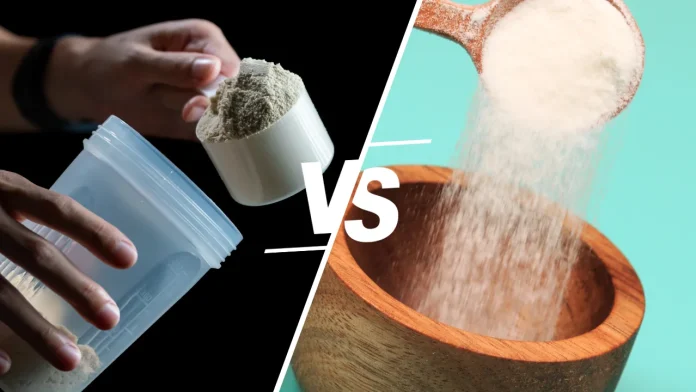In the pursuit of a healthier lifestyle, fitness enthusiasts are increasingly turning to protein supplements to enhance their overall well-being. Two popular options on the market are collagen and whey protein. What’s the difference between collagen vs whey protein, and which is better for your fitness and health goals? In this article, we’ll differentiate between these two protein sources, evaluating their respective advantages and drawbacks to help you make an informed decision for your health.
You May Also Like:
Bulletproof Collagen Protein vs Frog Fuel Power Protein
Is a High Protein Vegetarian Diet Plan Even Possible? The Answer May Surprise You.
Collagen vs Whey Protein: Which Is Your Best Bet for Maximum Health? is an original (HighProteinLife) article.
The protein puzzle
Before delving into the collagen vs whey protein debate, it’s essential to grasp why protein is so crucial for your health. Proteins are essential macronutrients composed of amino acids, often referred to as the building blocks of life. Proteins are involved in many bodily functions, such as muscle growth, tissue repair, enzyme synthesis, and immune system support.
Protein can come from animal and plant-based sources, as well as through supplements. It’s imperative to make this distinction for those with diet restrictions. While protein is often associated with animal-based sources, it’s worth noting that plant-based options can also provide valuable protein content.
Enhancing workouts with protein
Protein is vital in enhancing workout performance and facilitating post-exercise recovery. Whether you’re a seasoned athlete or just trying to stay fit, ensuring adequate protein in your diet can immensely impact your fitness journey.
Muscle Building
Protein is the foundation of muscle growth and repair. Intensive physical activity subjects your muscles to stress and microtears. Protein provides your muscles with amino acids to repair and rebuild your muscles, leading to increased muscle mass and strength over time.
Improved Endurance
Protein can boost your endurance during workouts. It fuels your body with a constant energy source, preventing premature muscle fatigue and enhancing stamina, which is crucial for athletes like cyclists and runners.
Faster Recovery
Protein helps your body recover from workouts by reducing muscle soreness and inflammation. It speeds up healing, ensuring that you can return to your next workout feeling your best.
Appetite Control
Foods high in protein can help manage your appetite. Their capacity to induce a lasting feeling of fullness can keep you from overeating, making them a powerful ally in helping you achieve your weight loss goals.
Adding protein into your dietary routine before and after workouts can help you achieve better results, propelling you toward your fitness goals. Protein is an astounding ally to any health or fitness routine, whether you prefer protein-rich foods or supplements.

Collagen vs whey protein:
Unveiling collagen
What is collagen?
Collagen is the most common protein in your body, comprising much of your skin, hair, nails, tendons, ligaments, and bones. It is a structural protein, giving your tissues strength and elasticity. Unfortunately, collagen production slows as you age; this natural decline is a key contributor to the appearance of aging skin, and it also plays a role in the onset of joint stiffness, a common ailment associated with aging.
Health and wellness benefits of collagen
- Skin health: Collagen has the capacity to increase skin elasticity and hydration. Because of these benefits, collagen supplements are often used to help reduce the appearance of wrinkles and fine lines.
- Joint support: Collagen supports strength and flexibility in your cartilage, which enhances overall joint health. If you struggle with joint issues or simply want to avoid them, collagen supplementation is a promising solution.
- Gut health: Studies have demonstrated collagen’s potential to help repair your digestive tract’s lining. This restorative property makes it helpful for managing conditions like leaky gut syndrome.
- Hair and nail strength: Collagen’s structural benefits present an excellent solution for combating dryness and brittleness, leaving you with luscious locks and resilient nails.
While collagen can benefit your overall health alone, it falls short of being a complete protein due to its deficiency in several essential amino acids.
Collagen vs whey protein:
Examining whey protein
What is whey protein?
Whey protein is a complete protein created as a byproduct during the cheese-making process. Whey contains all the essential amino acids your body needs. Notably, it is easily absorbed, which makes it popular among athletes and fitness enthusiasts.
Health and wellness benefits of whey protein
- Muscle growth: Whey can stimulate protein production within muscles, making it an invaluable tool for those seeking to increase or maintain muscle mass.
- Weight management: Whey protein has appetite-suppressing qualities, which can be beneficial for weight management.
- Immune system Support: Whey has immunoglobins and lactoferrin, which may promote immune system function.
- Antioxidant properties: Some studies have shown that whey protein might exhibit antioxidant properties. This could potentially translate into the capacity to fight oxidative stress, UV-induced damage, and inflammation.
While whey has some helpful health benefits, it may not be a suitable option for everyone. Those who have dairy allergies or lactose intolerance may need to exercise caution or explore alternative protein sources. It is also considered an animal byproduct, making it unsuitable for individuals committed to vegan lifestyles.

Collagen vs whey protein:
A comparative analysis
Now that you know more about each of these proteins, let’s compare them based on the following factors:
Protein composition
Collagen: Collagen is primarily composed of glycine, proline, hydroxyproline, and arginine. However, it is not a complete protein because it does not contain all essential amino acids.
Whey: Whey is a complete protein because it contains all the essential amino acids your body needs.
Digestibility
Collagen: Collagen is easy to digest and is gentle on the stomach, which makes it an excellent choice for those who struggle with digestive issues.
Whey: While the body generally digests whey protein well, it can cause gastrointestinal issues, especially if you’re lactose intolerant.
Absorption rate
Collagen: Traditional collagen exhibits a slower absorption rate within the body, which makes it optimal for lasting benefits. On the other hand, liquid collagen tends to absorb faster than other supplement forms.
Whey: Because whey absorbs quickly in your body, it’s great for post-workout recovery.
Targeted benefits
Collagen: Collagen’s multifaceted advantages encompass improvements in skin, hair, nails, joint health, and gut function.
Whey: Whey protein predominantly shines in the realm of muscle growth and overall fitness enhancement.
Allergies and intolerances
Collagen: Collagen tends to be well-tolerated and rarely triggers allergic reactions.
Whey: Whey protein can potentially cause allergic reactions or digestive discomfort, especially for those with dairy allergies or lactose intolerance.
Versatility
Collagen: You can include collagen in various recipes, including smoothies, soups, and baked goods.
Whey: Whey protein is often found in shakes and protein bars, catering to the convenience-oriented fitness enthusiast.
Collagen vs whey protein:
Which is right for you?
When choosing whether to opt for whey or collagen supplementation, it’s vital to consider your health and wellness goals.
Choose collagen if:
- You want to enhance the appearance of your skin, hair, and nails or prioritize your joint health.
- You have a sensitive stomach or struggle with digestive problems.
- Gut health holds significant importance in your wellness journey.
Choose whey protein if:
- You want to build or manage muscle mass.
- Post-workout recovery is an important focus for you.
- You need a quick, convenient protein source.
You can also opt to incorporate both protein types into your daily regimen, capitalizing on the distinct advantages each offers.

Frog Fuel Power Protein:
A trusted source of collagen
Finding a trustworthy brand for your supplements is as critical as your workout routine. Frog Fuel Power Protein is a reputable source of high-quality collagen supplements. With a focus on product quality, Frog Fuel has earned a solid reputation in the health and fitness communities. Frog Fuel’s formula originated in the medical industry and is trusted by around 4,000 facilities.
Complete protein
Unlike most collagen supplements, Frog Fuel Power Protein is fortified with essential amino acids, making it a complete protein. This fortification gives Frog Fuel’s formula the unique ability to provide your body with all the amino acids it needs for effective muscle repair and recovery.
Unwavering quality
Because of its origins in the medical field and the goals of its founders, former Navy SEALs seeking a supplement to meet the high physical demands of the military, Frog Fuel places paramount importance on quality. Their supplements are formulated to meet the highest industry standards. From sourcing high-quality ingredients to enforcing strict quality control measures, Frog Fuel ensures they back up their promises.
Scientifically backed
Frog Fuel Power Protein is unique for its science-backed formulation. Their collagen supplements are the product of extensive research. Their collagen formula is unique from other liquid collagen supplements because it contains nano-hydrolyzed collagen, a breakthrough achieved through enzymatic breakdown, enhancing bioavailability and reducing absorption time. Whether you want to improve your skin and joint health or overall well-being, Frog Fuel’s products are designed with your needs in mind.
Trusted by athletes and fitness enthusiasts
Frog Fuel Power Protein is trusted by professional athletes, fitness aficionados, and health enthusiasts alike. Whether you’re a top athlete seeking peak performance or just looking for a healthier lifestyle, Frog Fuel has emerged as a premium choice for those looking to get the most out of their training.
Exceptional purity
Purity is a primary highlight of Frog Fuel’s collagen products. Their formula is free from unnecessary additives, giving you the purest form of collagen without fillers or artificial ingredients. This commitment to purity displays their dedication to the well-being of their consumers.
Transparent and accessible information
Transparency is another key benefit of Frog Fuel Power Protein. Their packaging and website provide detailed product information, so you know what goes into your body. When you opt for Frog Fuel, you are making a choice rooted in knowledge and transparency, safeguarding your health.
Convenience
Unlike some bulky protein powders that won’t fit in your gym bag, Frog Fuel Power Protein comes in small, convenient pouches that will fit in any pocket, purse, or gym bag, making it ideal for even the busiest of individuals.
Collagen vs whey protein:
The bottom line
When choosing between whey and collagen proteins, knowing your specific needs and goals is essential. Both types of proteins boast many benefits. However, if you’re seeking a protein source with superior bioavailability and rapid absorption, liquid collagen products such as Frog Fuel Power Protein may be your best option.
Bioavailability: Liquid collagen, praised for its high bioavailability, ensures that your body can absorb and use its nutrients more efficiently. When paired with Frog Fuel’s nano-hydrolyzed formula, this translates to optimal absorption, which means you get better results whether you’re trying to boost your skin’s glow and vitality, promote joint and gut health, or get the most out of your fitness regimen.
Rapid Absorption: Liquid collagen’s quick absorption distinguishes it from other supplement methods. Opting for liquid collagen expedites the delivery of its benefits, making it great for workouts, skincare routines, and post-exercise recovery.
In contrast, other collagen sources like powders or capsules may break down more slowly, which could affect the speed and effectiveness of your overall results.
Whether you choose collagen, whey or consider an integration of both, you should align your choice with your personal goals. Furthermore, make sure you consult a healthcare professional before adding any new supplement to determine what is best for your health needs.
Taking a holistic approach to health
Getting healthy and staying healthy requires a holistic approach that combines a balanced diet, regular exercise, and a healthy lifestyle. Make sure you remember to drink an appropriate amount of water each day and get 7-8 hours of sleep. Collagen and whey supplements can complement a balanced diet, propelling your wellness efforts and putting you on a path to a healthier you.

Further reading:
University Hospitals: How Microtears Help You to Build Muscle Mass
Mayo Clinic: Mayo Clinic Q and A: Collagen and biotin supplements
National Library of Medicine: A Review of the Effects of Collagen Treatment in Clinical Studies
Cleveland Clinic: When You Should Drink a Protein Shake
Johns Hopkins Medicine: Milk Allergy Diet
Important Note: The information contained in this article is for general informational purposes only, and should not be construed as health or medical advice, nor is it intended to diagnose, prevent, treat, or cure any disease or health condition. Before embarking on any diet, fitness regimen, or program of nutritional supplementation, it is advisable to consult your healthcare professional in order to determine its safety and probable efficacy in terms of your individual state of health.
Regarding Nutritional Supplements Or Other Non-Prescription Health Products: If any nutritional supplements or other non-prescription health products are mentioned in the foregoing article, any claims or statements made about them have not been evaluated by the U.S. Food and Drug Administration, and such nutritional supplements or other health products are not intended to diagnose, treat, cure, or prevent any disease.
